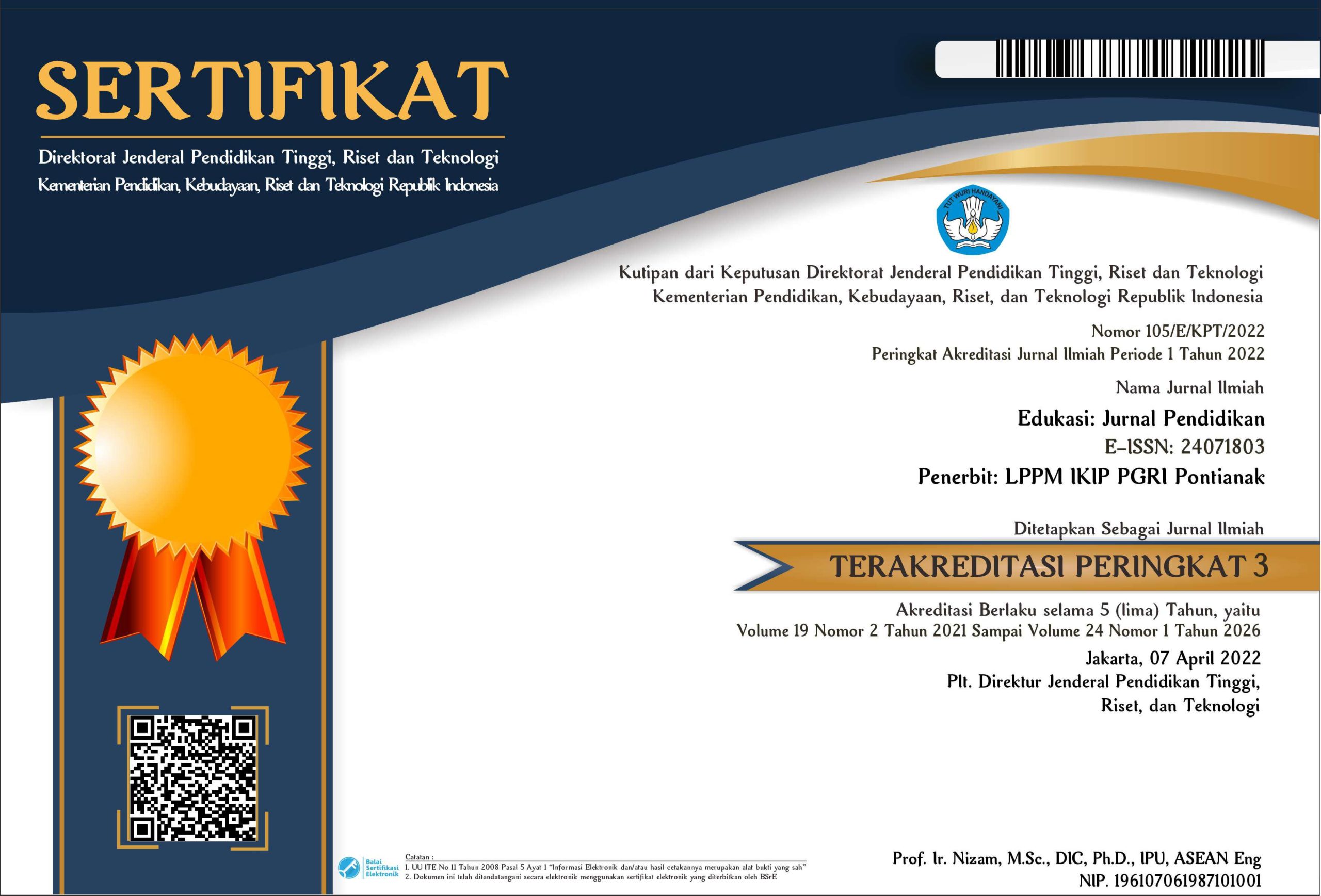English-Based Learning Needs for Specific Purposes: An Analysis
DOI:
https://doi.org/10.31571/edukasi.v21i1.5517Keywords:
needs analysis, english-based learning, english specific purposes, analisis kebutuhan, pembelajaran berbasis bahasa Inggris, bahasa Inggris tujuan khususAbstract
Abstract
This research aimed to analyze the learning needs of English for students. The research method was used descriptively. Data collection was carried out using an online questionnaire via Google Forms to students to identify the needs and expectations of students in learning English. The number of samples was 50 students with the sampling technique using simple random sampling. The data analysis technique used descriptive quantitative. The results of the research showed that students of the Faculty of Science and Technology need to learn English which focuses on improving the four language skills, namely speaking, writing, listening, and reading. Students also hope to learn more English vocabulary related to their major because it is useful for them in the learning process of the subjects in their major.
Â
Abstrak
Penelitian bertujuan untuk menganalisis kebutuhan pembelajaran bahasa Inggris bagi mahasiswa. Metode penelitian yang digunakan adalah penelitian deskriptif. Pengumpulan data dilakukan menggunakan kuesioner online melalui Google Forms kepada mahasiswa untuk mengidentifikasi kebutuhan dan harapan mahasiswa dalam pembelajaran bahasa Inggris. Jumlah sampel sebanyak 50 siswa dengan teknik pengambilan sampel menggunakan simple random sampling. Teknik analisis data yang digunakan adalah deskriptif kuantitatif. Hasil penelitian menunjukkan bahwa mahasiswa Fakultas Sains dan Teknologi perlu mempelajari bahasa Inggris yang menitikberatkan pada peningkatan empat keterampilan berbahasa, yaitu berbicara, menulis, menyimak, dan membaca. Mahasiswa juga berharap untuk mempelajari lebih banyak kosakata bahasa Inggris yang berkaitan dengan jurusan karena berguna dalam proses pembelajaran mata kuliah di jurusan.
Downloads
References
Aflah, M. N., & Rahmani, E. F. (2018). Analisa Kebutuhan (Need Analysis) Mata Kuliah Bahasa Inggris untuk Mahasiswa Kejuruan. Jurnal Pendidikan Bahasa, 7(1), 77-89. https://doi.org/10.31571/bahasa.v7i1.828.
Agirdag, O. (2013). The Long-Term Effects of Bilingualism on Children of Immigration: Student Bilingualism and Future Earnings. International Journal of Bilingual Education and Bilingualism, 17(4), 449-464. https://doi.org/10.1080/13670050.2013.816264.
Al-Nasser, A. S. (2015). Problems of English Language Acquisition in Saudi Arabia: An Exploratory-Cum-Remedial Study. Theory and Practice in Language Studies, 5(8), 1612-1619. http://dx.doi.org/10.17507/tpls.0508.10.
Alsamadani, H. (2017). Needs Analysis in ESP Context: Saudi Engineering Students as a Case Study. Advances in Language and Literary Studies, 8(6), 58-68. https://doi.org/10.7575/aiac.alls.v.8n.6p.58.
Alqahtani, M. (2015). The Importance of Vocabulary in Language Learning and How to be Taught. International Journal of Teaching and Education, III(3), 21-34. https://doi.org/10.20472/te.2015.3.3.002.
Arnó-Macià , E., Aguilar-Pérez, M., & Tatzl, D. (2020). Engineering Students’ Perceptions of the Role of ESP Courses in Internationalized Universities. English for Specific Purposes, 58(April), 58-74. https://doi.org/10.1016/j.esp.2019.12.001.
Asrifan, A., Vargheese, K., T., S., & Amir, M. (2020). ESP Course Design: The Need Analysis on Tourism Department in Indonesia Vocational High Schools. Journal of Advanced English Studies, 3(2), 69-77. https://doi.org/10.47354/jaes.v3i2.85.
Banditvilai, C. (2016). Enhancing Students Language Skills through Blended Learning. Electronic Journal of e-Learning, 14(3), 223‑232.
Baranovskaya, T., & Shaforostova, V. (2018). Learner Autonomy through Role Plays in English Language Teaching. Journal of Language and Education, 4(4), 8-19. https://doi.org/10.17323/2411-7390-2018-4-4-8-19.
Bohlmann, N. L., Maier, M. F., & Palacios, N. (2015). Bidirectionality in Self-Regulation and Expressive Vocabulary: Comparisons Between Monolingual and Dual Language Learners in Preschool. Child Development, 86(4), 1094-1111. https://doi.org/10.1111/cdev.12375.
Bunch, G. C. (2013). Pedagogical Language Knowledge: Preparing Mainstream Teachers for English Learners in the New Standards Era. Review of Research in Education, 37(1), 298-341. https://doi.org/10.3102/0091732X12461772.
Chovancová, B. (2014). Needs Analysis and ESP Course Design: Self-Perception of Language Needs Among Pre-Service Students. Studies in Logic, Grammar and Rhetoric, 38(1), 43-57. https://doi.org/10.2478/slgr-2014-0031.
Elfers, A. M., & Stritikus, T. (2014). How School and District Leaders Support Classroom Teachers’ Work with English Language Learners. Educational Administration Quarterly, 50(2), 305-344. https://doi.org/10.1177/0013161X13492797.
Farah, R. R. (2021). Exploring the English Needs of Mechanical Engineering Students in ESP Class: Indonesian University Context. Al-Ta Lim Journal, 28(1), 76-81. https://doi.org/10.15548/jt.v28i1.627.
Fernald, A., Marchman, F. A., & Weislede, A. (2013). SES Differences in Language Processing Skill and Vocabulary are Evident at 18 months. Development Science, 16(2), 234-248. https://doi.org/10.1111/desc.12019.
Fitria, T. N. (2020). Teaching English for Specific Purposes to the Students in English Language Teaching. Journal of English Teaching, 5(1), 55-66. https://doi.org/10.36456/jet.v5.n01.2020.2276.
Hitt, D. H., & Tucker, P. D. (2016). Systematic Review of Key Leader Practices Found to Influence Student Achievement: A Unified Framework. Review of Educational Research, 86(2), 531-569. https://doi.org/10.3102/0034654315614911.
Hosni, S. A. (2014). Speaking Difficulties Encountered by Young EFL Learners. International Journal on Studies in English Language and Literature (IJSELL), 2(6), 22-30.
Iberahim, A., Yunus, M. M., & Sulaiman, N. A. (2023). A Review on Technology Enhanced Language Learning (TELL). International Journal of Academic Research in Business and Social Sciences, 13(2), 1509-1519. https://doi.org/10.6007/ijarbss/v13-i2/16496.
Kaur, D., & Aziz, A. A. (2020). The Use of Language Game in Enhancing Students’ Speaking Skills. International Journal of Academic Research in Business and Social Sciences, 10(12), 687-706. https://doi.org/10.6007/ijarbss/v10-i12/8369.
Kim, W. G., & GarcÃa, S. B. (2014). Long-Term English Language Learners’ Perceptions of Their Language and Academic Learning Experiences. Remedial and Special Education, 35(5), 300-312. https://doi.org/10.1177/0741932514525047.
Kuśnierek, A. (2016). The Role of Music and Songs in Teaching English Vocabulary to Students. World Scientific News, 43(1), 1-55.
Lee, O., Quinn, H., & Valdés, G. (2013). Science and Language for English Language Learners in Relation to Next Generation Science Standards and with Implications for Common Core State Standards for English Language Arts and Mathematics. Educational Researcher, 42(4), 223-233. https://doi.org/10.3102/0013189X13480524.
Menggo, S., Ndiung, S., & Midun, H. (2022). Integrating 21st-Century Skills in English Material Development: What do College Students Really Need? Englisia: Journal of Language, Education, and Humanities, 9(2), 165-186. http://dx.doi.org/10.22373/ej.v9i2.10889.
Natsir, M., Soleh Purba, A., Thesisia Saragih, A., & Khair Amal, B. (2022). English Teaching in an Indonesian Vocational High School Majoring Industrial Machinery Engineering. Jurnal Pendidikan, 14(2), 1743-1754. https://doi.org/10.35445/alishlah.v14i1.1221.
Rahman, M. (2015). English for Specific Purposes (ESP): A Holistic Review. Universal Journal of Educational Research, 3(1), 24-31. https://doi.org/10.13189/ujer.2015.030104.
Sari, R. K. (2019). Analisis Kebutuhan Pembelajaran Bahasa Inggris pada Mahasiswa Kelas Karyawan. SAP (Susunan Artikel Pendidikan), 4(1), 38-45. https://doi.org/10.30998/sap.v4i1.3612.
Simanjuntak, M. (2020). The Effects of Integration Between Kurikulum 2013 and Cambridge Curriculum in English (Study Case Taken from Saint Peter's Junior High School). Journal of Advanced English Studies, 3(1), 50-59. https://doi.org/10.47354/jaes.v3i1.77.
Susandi, N. K. A., & Krishnawati, N. L. P. (2016). Needs Analysis: ESP Syllabus Design for Indonesian EFL Nursing Students. Proceedings of ISELT FBS Universitas Negeri Padang.
Tran, T. T. Q., Admiraal, W., & Saab, N. (2019). Effects of Critical Incident Tasks on the Intercultural Competence of English Non-Majors. Intercultural Education, 30(6), 618-633. https://doi.org/10.1080/14675986.2019.1664728.
Downloads
Published
How to Cite
Issue
Section
License
Authors who publish in this journal agree to the following terms:
- Authors retain copyright and grant the journal the right of first publication with the work simultaneously licensed under a Creative Commons Attribution License (CC-BY-NC) that allows others to share the work with an acknowledgment of the work's authorship and initial publication in this journal.
- Authors are able to enter into separate, additional contractual arrangements for the non-exclusive distribution of the journal's published version of the work (e.g., post it to an institutional repository or publish it in a book), with an acknowledgment of its initial publication in this journal.
- Authors are permitted and encouraged to post their work online (e.g., in institutional repositories or on their website) prior to and during the submission process, as it can lead to productive exchanges, as well as earlier and greater citation of published work.

 Download: 213
Download: 213


















